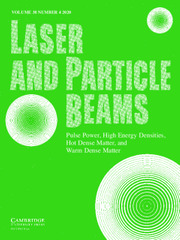Crossref Citations
This article has been cited by the following publications. This list is generated based on data provided by
Crossref.
Sharma, R.P.
Sharma, Prerana
Rajput, Shivani
and
Bhardwaj, A.K.
2009.
Suppression of stimulated Brillouin scattering in laser beam hot spots.
Laser and Particle Beams,
Vol. 27,
Issue. 4,
p.
619.
Verma, U.
and
Sharma, A.K.
2009.
Laser second harmonic generation in a rippled density plasma in the presence of azimuthal magnetic field.
Laser and Particle Beams,
Vol. 27,
Issue. 4,
p.
719.
Sharma, Prerana
and
Sharma, R.P.
2010.
Generation of Longmuir turbulence and stochastic acceleration in laser beat wave process.
Laser and Particle Beams,
Vol. 28,
Issue. 2,
p.
285.
Mao, Q.Q.
Kong, Q.
Ho, Y.K.
Che, H.O.
Ban, H.Y.
Gu, Y.J.
and
Kawata, S.
2010.
Radiative reaction effect on electron dynamics in an ultra intense laser field.
Laser and Particle Beams,
Vol. 28,
Issue. 1,
p.
83.
Garg, Vijay
and
Tripathi, V.K.
2010.
Resonant third harmonic generation of an infrared laser in a semiconductor wave guide.
Laser and Particle Beams,
Vol. 28,
Issue. 2,
p.
327.
Xu, Junjie
Yu, Yongli
and
Zeng, Bin
2010.
Extension of harmonic cut-off in a waveform controlled laser field by prolonging the recombining period.
Laser and Particle Beams,
Vol. 28,
Issue. 3,
p.
415.
Liu, Bin
Zhang, Hua
Fu, Li-Bin
Gu, Yu-Qiu
Zhang, Bao-Han
Liu, Ming-Ping
Xie, Bai-Song
Liu, Jie
and
He, Xian-Tu
2010.
Ion jet generation in the ultraintense laser interactions with rear-side concave target.
Laser and Particle Beams,
Vol. 28,
Issue. 2,
p.
351.
Geissel, Matthias
Schollmeier, Marius S.
Kimmel, Mark W.
Rambo, Patrick K.
Schwarz, Jens
Atherton, Briggs W.
and
Brambrink, Erik
2011.
Characterizing plasma mirrors near breakdown.
Review of Scientific Instruments,
Vol. 82,
Issue. 5,
Omatsu, T.
Kong, H.J.
Park, S.
Cha, S.
Yoshida, H.
Tsubakimoto, K.
Fujita, H.
Miyanaga, N.
Nakatsuka, M.
Wang, Y.
Lu, Z.
Zheng, Z.
Zhang, Y.
Kalal, M.
Slezak, O.
Ashihara, M.
Yoshino, T.
Hayashi, K.
Tokizane, Y.
Okida, M.
Miyamoto, K.
Toyoda, K.
Grabar, A.A.
Kabir, Md. M.
Oishi, Y.
Suzuki, H.
Kannari, F.
Schaefer, C.
Pandiri, K.R.
Katsuragawa, M.
Wang, Y.L.
Lu, Z.W.
Wang, S.Y.
Zheng, Z.X.
He, W.M.
Lin, D.Y.
Hasi, W.L.J.
Guo, X.Y.
Lu, H.H.
Fu, M.L.
Gong, S.
Geng, X.Z.
Sharma, R.P.
Sharma, P.
Rajput, S.
Bhardwaj, A.K.
Zhu, C.Y.
and
Gao, W.
2012.
The Current Trends in SBS and phase conjugation.
Laser and Particle Beams,
Vol. 30,
Issue. 1,
p.
117.
Khalilzadeh, E.
Yazdanpanah, J.
Jahanpanah, J.
and
Chakhmachi, A.
2016.
Numerical modeling of radiative recombination during ionization of atoms by means of particle-in-cell simulation.
Laser and Particle Beams,
Vol. 34,
Issue. 2,
p.
284.
Mu, J.
Li, F.-Y.
Sheng, Z.-M.
and
Zhang, J.
2016.
Effect of transverse magnetic fields on high-harmonic generation in intense laser–solid interaction.
Laser and Particle Beams,
Vol. 34,
Issue. 3,
p.
545.
Edwards, M. R.
Griffith, A.
Bennett, T.
and
Mikhailova, J. M.
2018.
Relativistic Laser-Plasma Diagnostics with the Third Harmonic.
p.
JTu3A.140.
Samarin, G. M.
Zepf, M.
and
Sarri, G.
2018.
Radiation reaction studies in an all-optical set-up: experimental limitations.
Journal of Modern Optics,
Vol. 65,
Issue. 11,
p.
1362.
Raffestin, D.
Boutoux, G.
Blanchot, N.
Batani, D.
D’Humières, E.
Moreno, Q.
Longhi, T.
Coïc, H.
Granet, F.
Rault, J.
Liberatore, C.
Jakubowska, K.
and
Tikhonchuk, V.
2019.
Application of harmonics imaging to focal spot measurements of the “PETAL” laser.
Journal of Applied Physics,
Vol. 126,
Issue. 24,
Edwards, M. R.
Fasano, N. M.
Bennett, T.
Griffith, A.
Turley, N.
O’Brien, B. M.
and
Mikhailova, J. M.
2020.
A multi-terawatt two-color beam for high-power field-controlled nonlinear optics.
Optics Letters,
Vol. 45,
Issue. 23,
p.
6542.
Crespo, Helder M.
Witting, Tobias
Canhota, Miguel
Miranda, Miguel
and
Tisch, John W. G.
2020.
In situ temporal measurement of ultrashort laser pulses at full power during high-intensity laser–matter interactions.
Optica,
Vol. 7,
Issue. 8,
p.
995.
Sharma, Soni
and
Vijay, A.
2020.
Resonant second–harmonic generation in a magnetized plasma embedded with clusters.
Optik,
Vol. 204,
Issue. ,
p.
164023.
Edwards, M R.
Fasano, N. M.
Lepowsky, E.
Giakas, A.
Bennett, T.
and
Mikhailova, J. M.
2020.
Cascaded Plasma Mirrors for Enhanced Relativistic Harmonic Generation.
p.
FF2C.1.
Kon, Akira
Nishiuchi, Mamiko
Fukuda, Yuji
Kondo, Kotaro
Ogura, Koichi
Sagisaka, Akito
Miyasaka, Yasuhiro
Dover, Nicholas P.
Kando, Masaki
Pirozhkov, Alexander S.
Daito, Izuru
Chang, Liu
Choi, Il Woo
Nam, Chang Hee
Ziegler, Tim
Schlenvoigt, Hans-Peter
Zeil, Karl
Schramm, Ulrich
and
Kiriyama, Hiromitsu
2022.
Characterization of the plasma mirror system at the J-KAREN-P facility.
High Power Laser Science and Engineering,
Vol. 10,
Issue. ,


